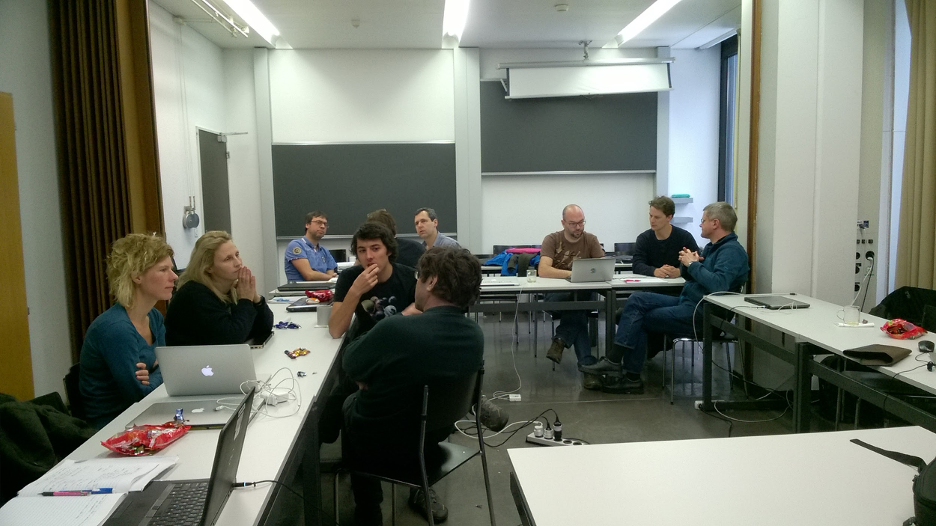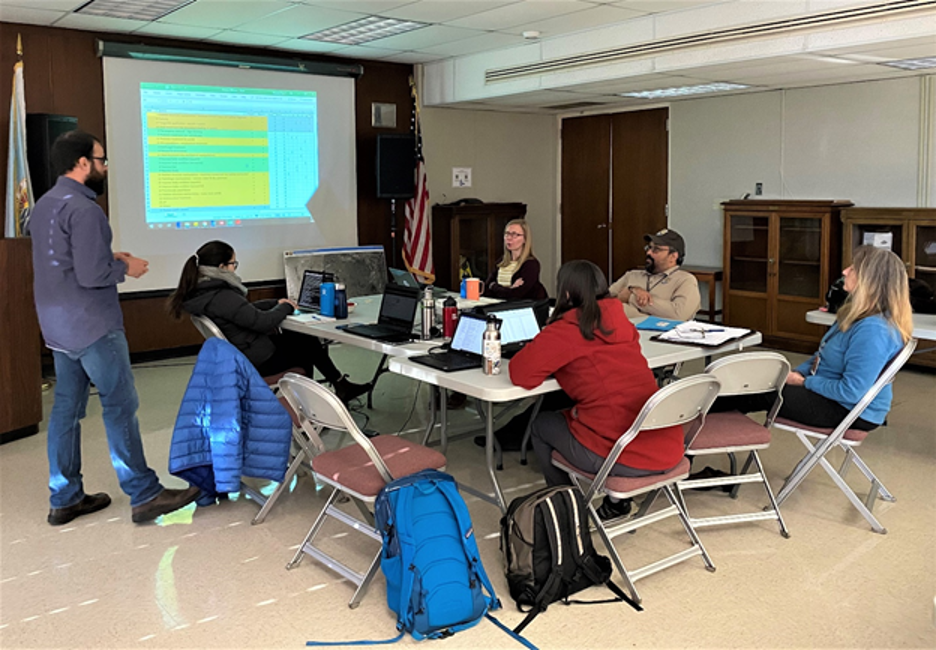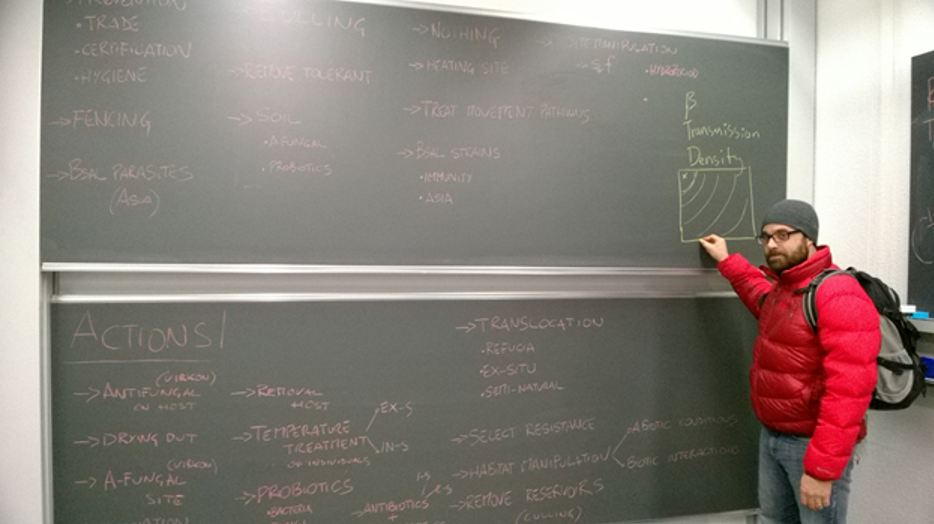Decision Science Working Group
Emerging diseases have the potential to affect social, economic and ecological interests of North American resource managers, who are entrusted by society to manage protected areas and wildlife populations. Resource managers must consider multiple social, economic and ecological objectives, which result in difficult trade-offs for any given disease management strategy (i.e., an optimal action for managing a wildlife disease may result in declines in recreational or economic values). Complexity arises in balancing numerous and competing demands on land managers, and this effectively limits our ability to identify and implement proactive management – representing a major challenge for developing management strategies for Bsal and other emerging infectious diseases. Decision science represents a framework for developing strategies and determining a course of action in the face of uncertainty. Decision analysis helps identify optimal solutions across potentially competing management objectives.
The goal of the Decision Science Working Group (DSWG) of the North American Bsal Task Force is to support management decisions regarding Bsal through:
- facilitation of decision-making processes
- identification and collation of information needed to make decisions
- development of models to predict the outcomes of different management options
- evaluation of trade-offs and risk to overcome impediments to optimal decision-making
The DSWG is currently composed of eight members, representing both Federal agency and academic entities. Collectively, the group has decades of experience in decision science, amphibian and pathogen ecology, mathematical modeling, and working with state and Federal land managers.

Participants at a Structured Decision Making Workshop to evaluate a range of management actions that could be used during an outbreak of Bsal in Europe. Photo taken by Stefano Canessa.
Working Group Products (WG members in bold):
Bernard, Riley F. and Evan H. Campbell Grant. 2019. Identifying common decision problem elements for the management of emerging fungal diseases of wildlife. Society and Natural Resources. 32:9 1040-1055. doi: 10.1080/08941920.2019.1610820
Bozzuto, C., Benedikt R. Schmidt, and Stefano Canessa. (2019). Active responses to outbreaks of infectious wildlife diseases: objectives, strategies and limitations determine feasibility and success. Revision submitted. Proceedings of the Royal Society B. Original preprint uploaded to Researchgate 12/2019. DOI: 10.13140/RG.2.2.35153.07525/1
Canessa, Stefano, Claudio Bozzuto, Frank Pasmans, and An Martel. 2019. Quantifying the burden of managing wildlife diseases in multiple host species. Conservation Biology. 33:5 1131-1140. doi: 10.1111/cobi.13313
Canessa, Stefano, Annemarieke Spitzen-van der Sluijs, Tariq Stark, Bryony E. Allen, Phillip J. Bishop, Molly Bletz, Cheryl J. Briggs, David R. Daversa, Matthew J. Gray, Richard A. Griffiths, Reid N. Harris, Xavier A. Harrison, Jason T. Hoverman, Phillip Jervis, Erin Muths, Deanna H. Olson, Stephen J. Price, Corinne L. Richards-Zawacki, Jaquez Robert, Conçalo M. Rosa, Ben C. Scheele, Benedikt R. Schmidt, and Trenton W. J. Garner. 2019. Conservation decisions under pressure: Lessons from an exercise in rapid response to wildlife disease. Conservation Science and Practice. 2:1 e141. doi: 10.1111/csp2.141
Canessa, Stefano, Annemarieke Spitzen-van der Sluijs, An Martel, and Frank Pasmans. 2019. Mitigation of amphibian disease requires a stronger connection between research and management. Biological Conservation. 236: 236-242. doi: 10.1016/j.biocon.2019.05.030
Canessa, Stefano, Claudio Bozzuto, Evan H. Campbell Grant, Sam S. Cruickshank, Matthew C. Fisher, Jacob C. Koella, Stefan Lötters, An Martel, Frank Pasmans, Ben C. Scheele, Annemarieke Spitzen-van der Sluijs, Sebastian Steinfartz, and Benedikt R. Schmidt. 2018. Decision-making for mitigating wildlife diseases: From theory to practice for an emerging fungal pathogen of amphibians. Journal of Applied Ecology. 55:4 1987-1996. doi: 10.1111/1365-2664.13089
DiRenzo, Grazella V. and Evan H. Campbell Grant. 2019. Overview of emerging amphibian pathogens and modeling advances for conservation-related decisions. Biological Conservation. 236: 474-483. doi: 10.1016/j.biocon.2019.05.034
Grant, Evan H. Campbell, Erin Muths, Rachel A. Katz, Stefano Canessa, Michael J. Adams, Jennifer R. Ballard, Lee Berger, Cheryl J. Briggs, Jeremy T. H. Coleman, Matthew J. Gray, M. Camille Harris, Reid N. Harris, Black Hossack, Katheryn P. Huyvaert, Jonathan Kolby, Karen R. Lips, Robert E. Lovich, Hamish I. McCallum, Joseph R. Mendelson III, Priya Nanjappa, Deanna H. Olson, Jenny G. Powers, Katherine L. D. Richgels, Robin E. Russell, Benedikt R. Schmidt, Annemarieke Spitzen-van der Sluijs, Mary Kay Watry, Douglas C. Woodhams, and C. LeAnn White. 2017. Using decision analysis to support proactive management of emerging infectious wildlife diseases. Frontiers in Ecology and the Environment. 15:4 214-221. doi: 10.1002/fee.1481

Structured Decision Making Workshop to identify proactive management for Bsal on Patuxent Research Refuge, January 2020. From left to right: Evan H. Campbell Grant, Grazella V. DiRenzo, Molly Bletz, Adrianne Brand, Tarik Adams, and Sandy Spencer. Photo taken by Riley F. Bernard.
Member list
The DSWG is currently composed of eight members, representing both Federal agency and academic entities. Collectively, the group has decades of experience in decision science, amphibian and pathogen ecology, mathematical modeling, and working with state and Federal land managers.
Chair, Evan H. Campbell Grant, U.S. Geological Survey, Northeast Amphibian Research and Monitoring Initiative (profile)
Katrina Alger, U.S. Geological Survey, National Wildlife Health Center (profile)
Riley F. Bernard, University of Wyoming (profile)
Stefano Canessa, University of Ghent (profile)
Brittany Mosher, University of Vermont (profile)
Katherine Richgels, U.S. Geological Survey, National Wildlife Health Center (profile)
Robin Russell, U.S. Geological Survey, National Wildlife Health Center (profile)
Alex Wright, Michigan State University (profile)

Evan H. Campbell Grant, co-facilitator, after completion of the workshop in Zurich, Switzerland. Results can be found in Canessa et al. 2018. Journal of Applied Ecology. Photo taken by Stefano Canessa.
Mosher, Brittany A., Riley F. Bernard, Jeffrey M. Lorch, David A. W. Miller, Katherine L. D. Richgels, C. LeAnn White, and Evan H. Campbell Grant. 2020. Successful molecular detection studies require clear communication among diverse research partners. Frontiers in Ecology and the Environment. 18:1 43-51. doi: 10.1002/fee.2141
Richgels, Katherine L. D., Robin E. Russell, Michael J. Adams, C. LeAnn White, and Evan H. Campbell Grant. 2016. Spatial variation in risk and consequence of Batrachochytrium salamandrivorans introduction in the USA. Royal Society Open Science. 3: 150616. doi: 10.1098/rsos.150616
Russell, Robin E., Rachel A. Katz, Katherine L. D. Richgels, Daniel P. Walsh, and Evan H. Campbell Grant. 2017. A framework for modeling emerging diseases to inform management. 23:1 1-6. doi: 10.3201/eid2301.161452
Submitted/Revisions (WG members in bold):
Bernard, Riley F. and Evan H. Campbell Grant. In Review. Rapid assessment indicates context-dependent mitication for amphibian disease risk. Wildlife Society Bulletin.
Waddle, Hardin J., Daniel A. Grear, Brittany A. Mosher, Evan H. Campbell Grant, Michael J. Adams, Adam R. Backlin, William J. Barichivich, Adrianne B. Brand, Gary M. Bucciarelli, Daniel L. Calhoun, Tara Chestnut, Jon M. Davenport, Andrew E. Dietrich, Robert N. Fisher, Brad M. Glorioso, Brian J. Halstead, Marc P. Hayes, R. Ken Honeycutt, Blake R. Hossack, Patrick M. Kleeman, Julio A. Lemos-Espinal, Jeffrey M. Lorch, Brome McCreary, Erin Muths, Christopher A. Pearl, Katherine L. D. Richgels, Charles W. Robinson, Jennifer C. Rowe, Brent H. Sigafus, Iga Stasiak, Samuel Sweet, Susan C. Walls, Gregory J. Watkins-Colwell, C. LeAnn White, Lori A. Williams, and Megan E. Winzeler. In press. Batrachochytrium salamandrivorans (Bsal) not detected in an intensive survey of North American amphibians. Scientific Reports.
Wright, Alex D., Riley F. Bernard, Brittany A. Mosher, Katie M. O’Donnell, Taylor Braunagel, Grazella V. DiRenzo, Jillian E. Fleming, Charles Shafer, Adrianne B. Brand, Elise F. Zipkin, & Evan H. Campbell Grant. Minor Revisions. Moving from decision to action in conservation science. Biological Conservation.
